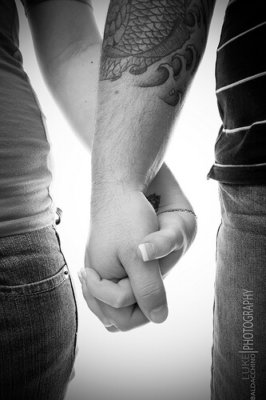Why We Hurt the Ones We Love

By: Tina Franklin
by Andrea M. Darcy
It can sometime seem that the more we love a partner or friend, the more we hurt them. No matter how hard we try not to.
The reasons why we hurt the ones we love
What makes this so often the case? What’s behind our habit of hurting?
1. You trust them.
When we become truly close to someone, we trust them enough we relax. Social conventions drop, and we are more of ourselves around them.
Of course we all have a more challenging side to our personality. When a relationship is truly healthy, a partner or friend should be able to see you as a whole person, and be able to understand that you are not perfect.
But if the other person is constantly ‘hurt’ from any apparent ‘bad behaviour’, it can be a red flag that they are not ready for an honest relationship. This often stems from not being able to accept their own different sides and suffering low self-esteem, which can often be connected to unresolved childhood trauma.
Of course it might be that you really are hurting your partner or friend because you are overreacting to any perceived slight. Which leads on to the next point.
2. They are triggering your past patterns.
If you find you are always reacting to what your loved one says, and that your reactions might be bigger than they need to be (this might require some self honesty), it could be that you are the one with unresolved issues.

By: Mike Tungate
Past issues we are either unaware of, or denying the impact of, don’t just vanish. The unprocessed emotions stay inside, and they can be a bit like volcanos, growing in heat with every experience that triggers a similar emotion until one small thing triggers an explosion.
You might even be repeating a past behavioural pattern you had with a parent or guardian. It’s actually very common to choose partners or friends who are similar to a parent you have the most unresolved issues with. This often means you might be taking out your resentment at a parent on someone else without realising it.
3. You are afraid of intimacy.
Another reason we hurt others is that they start to push at walls we might not even know we have.
Fear of intimacy can be more complicated than it sounds. Just because you can easily get into a relationship doesn’t mean you aren’t afraid of intimacy.
If there are parts of you you hold back, if you keep secrets, or if you find that the longer you are in a relationship the more you look for ways to sabotage, then you might want to read our popular article on 7 Surprising Signs You Fear Intimacy.
4. You are in need of more independency.
In relationships and even friendships it can be easy to at first fall into a pattern of spending all of your time together and forgetting about the independent life you once had. If this goes on for too long, the relationship can easily fall into codependency.
And codependency eventually reaches ‘the choking point’, where one party panics and feels they can’t breathe under the need the other person is bestowing on them. They want their independency back.
But if they are truly codependent, they often lack the capacity to communicate this need. Instead, they ‘act out’, doing something hurtful in an unconscious effort to create space between themselves and the other person.
5. You are in need of more dependency.

By: Luke Baldacchino
The other side of codependency is counterdependency – the belief that needing someone is not only bad, but dangerous. This is not true. Dependency is actually an important part of relationships when it is in equal balance and based on first being able to rely on yourself (read more in our article on Interdependency).
If you are dating or best friends with a counterdependent person, you might often be left feeling ignored or neglected as they hide behind things like overworking.
And if you don’t communicate your need for more time or attention from the other person, it might eventually burst out in hurtful statements. Again, it’s about lack of communication.
If this is a pattern for you, always needing more attention from your partners and friends, it can also be time to question how you are not meeting your own needs in life and if you are relying too much on others for your happiness and sense of self (codependency).
6. You suffer from impulsivity.
Do you seem to have a ‘tipping point’ where you can’t seem to control what comes out of your mouth if you feel you are being in some way put down, neglected, or abandoned? Only to later deeply regret it?
It might be that you suffer from what is known in psychology as ‘impulsivity’. Impulsivity can also be a sign you are suffering from other psychological issues, which can include ADHD, bipolar disorder, and if your impulsivity is triggered by feelings of abandonment, borderline personality disorder.
7. You want out of the relationship but you find this too hard to admit.
Sometimes the truth is that deep down we are hurting the one we love in little ways because we don’t just want some space, we want out.
It might be that you can’t even admit this to yourself, let alone your partner or walk out of a friendship. Your little acts of passive aggression are your unconscious ways to slowly push them to the point they leave you.
It’s possible you were programmed as a child with the core belief that you don’t leave relationships no matter what. For example, if your parents were unhappy but stayed together, this is the message it offers. Or, you might have had parents who split up and have made a vow to yourself at some point to ‘never be like them’. In either case, you are out of touch with your adult self and need to learn how to access your true thoughts and feelings.
Or, maybe you didn’t really hurt them at all.
If your loved one or friend is always claiming you hurt them, it might be that they are really just caught in a cycle of blame and psychological projection, making you responsible for everything they feel including their own low self-esteem.
While it’s not an excuse, and it is important to try to understand your partner, friends, and family members, you are not a mind reader. You can not be responsible if another person has not communicated their needs. If they feel you should spend more time together but never asked for it, then claim you hurt them by taking on a new work contract, the question becomes, why did they not say so?
What do I do if any of these reasons feels a bit close to home?
Many of the reasons above for hurting the ones we love relate to core issues that often surface in relationships – not communicating well and not having solid boundaries (which leads to codependency).
Both of these can ruin a relationship if left unresolved, which is a shame as sometimes two people are truly well suited but just need to learn how to identify and share their real feelings and needs.
This is why working with a couples counsellor can be such a great investment. A couples counsellor is not there to tell you what to do, but to help you both learn to communicate and find solutions yourselves.
If your reasons for hurting those you love might relate to unresolved past issues that are being triggered and ruining your relationships, working one-on-one with a counsellor can be a game changer. Any one of a variety of therapies can be helpful, such as psychodynamic therapy (looking at how your past has created your present) or person-centred counselling (focussing on your potential for growth).
Want to really focus on the way you relate? And want to try a short term therapy first, Consider a round of dynamic interpersonal therapy (DIT) which directly focuses on how your past dictates your behaviour in present-day relationships.
 Andrea M. Darcy is a mental health and wellbeing expert and personal development teacher. With training in person-centred counselling and coaching, she often writes about trauma and relationships. Find her on Instagram @am_darcy
Andrea M. Darcy is a mental health and wellbeing expert and personal development teacher. With training in person-centred counselling and coaching, she often writes about trauma and relationships. Find her on Instagram @am_darcy






Hello, this is something I am struggling with currently. I always seem to be upsetting my wife and daughter. Is there a book or some literature you can recommend to read? We’re already in counseling – together and separate. I would like to learn more about this on my own – outside of counseling. Thank you.